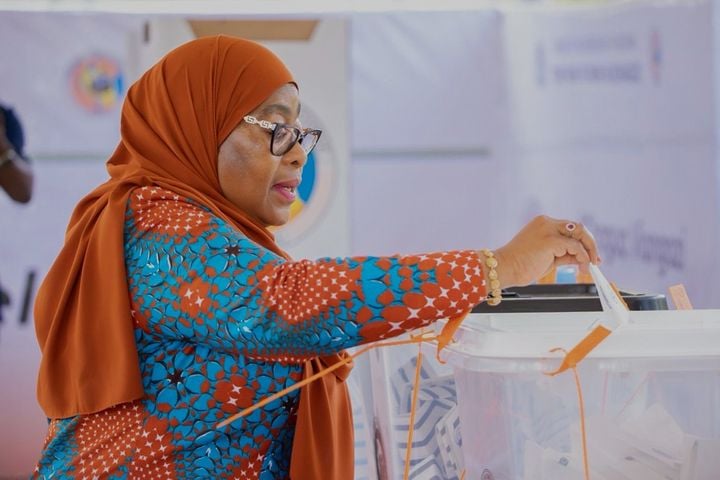UPDATE: Tanzanian President Samia Suluhu Hassan has won the country’s disputed election with a staggering 97% of the vote, according to official results announced early on Saturday, October 29, 2023. This announcement has ignited widespread outrage among opposition groups and critics, who claim the election was more a coronation than a democratic process.
The election was marred by significant violence, with protests erupting in major cities, including Dar es Salaam and Arusha. Demonstrators took to the streets to contest the legitimacy of the vote, leading to the deployment of military forces to assist police in controlling the riots. Internet connectivity across the country has been sporadic, further complicating the situation as citizens struggle to communicate and organize.
Reports indicate that the Tanzanian government has postponed the reopening of universities, originally scheduled for November 3, amidst the unrest. A tense calm hangs over the streets of Dar es Salaam, as security forces establish roadblocks to check identification. Although the government has not released official casualty figures, the UN human rights office has cited credible reports of at least 10 deaths linked to the protests, particularly in Dar es Salaam, Shinyanga, and Morogoro.
In a statement during a UN briefing, spokesperson Seif Magango expressed alarm at the violence, while UN Secretary-General Antonio Guterres urged all parties to “prevent further escalation.” A joint statement from the UK, Canada, and Norway highlighted “credible reports of a large number of fatalities and significant injuries” resulting from the government’s response to the protests.
The election faced criticism as two main opposition candidates were barred from running, raising questions about the fairness and transparency of the vote. Tundu Lissu, leader of the Chadema opposition group, has been jailed for months on treason charges after advocating for electoral reforms. Another opposition leader, Luhaga Mpina of the ACT-Wazalendo party, was also prevented from participating.
Despite the overwhelming victory, analysts note the Chama Cha Mapinduzi (CCM) party’s long-standing grip on power could be threatened by rising opposition figures. Historically, landslide victories are rare in the region, with Rwanda’s Paul Kagame being one of the few leaders to achieve such margins.
Human rights organizations, including Amnesty International, have reported a pattern of repression leading up to this election, with enforced disappearances, arbitrary arrests, and extrajudicial killings becoming commonplace. An alarming report from a UN panel noted over 200 cases of enforced disappearances since 2019, underscoring the tense political climate.
Ms. Hassan’s presidency follows a sudden transition after the death of her predecessor, John Pombe Magufuli, and her administration has faced scrutiny for its authoritarian tendencies. Critics argue that while previous leaders maintained a facade of tolerance toward opposition, Hassan’s government has clamped down on dissent with unprecedented severity.
As the situation unfolds, observers are urged to keep an eye on developments in Tanzania, where the balance between authoritarian control and the demands for democratic reform continues to hang in the balance. The international community watches closely as tensions rise in this key East African nation.







